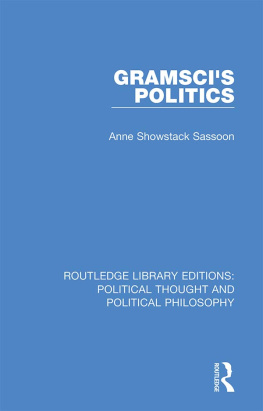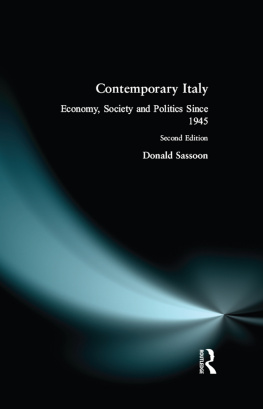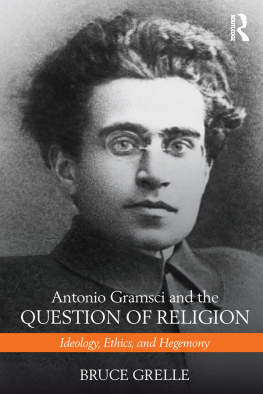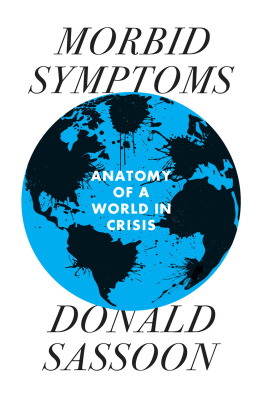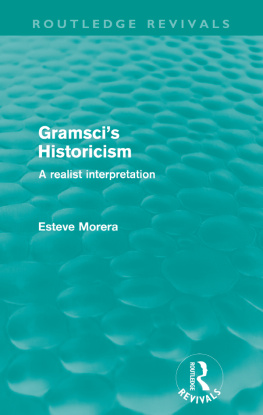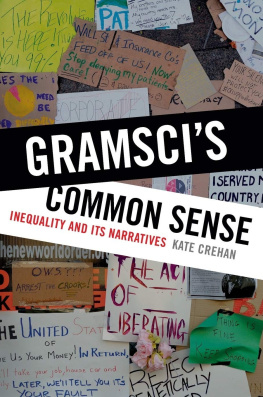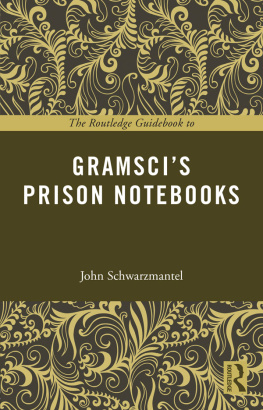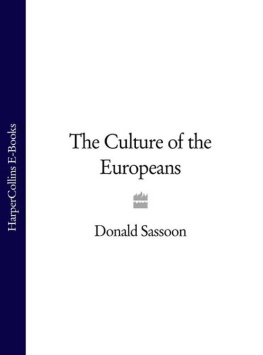ROUTLEDGE LIBRARY EDITIONS:
POLITICAL THOUGHT AND POLITICAL PHILOSOPHY
Volume 51
GRAMSCIS POLITICS
GRAMSCIS POLITICS
ANNE SHOWSTACK SASSOON
First published in 1980 by Croom Helm Ltd
This edition first published in 2020
by Routledge
2 Park Square, Milton Park, Abingdon, Oxon OX14 4RN
and by Routledge
52 Vanderbilt Avenue, New York, NY 10017
Routledge is an imprint of the Taylor & Francis Group, an informa business
1980 Anne Showstack Sassoon
All rights reserved. No part of this book may be reprinted or reproduced or utilised in any form or by any electronic, mechanical, or other means, now known or hereafter invented, including photocopying and recording, or in any information storage or retrieval system, without permission in writing from the publishers.
Trademark notice: Product or corporate names may be trademarks or registered trademarks, and are used only for identification and explanation without intent to infringe.
British Library Cataloguing in Publication Data
A catalogue record for this book is available from the British Library
ISBN: 978-0-367-21961-1 (Set)
ISBN: 978-0-429-35434-2 (Set) (ebk)
ISBN: 978-0-367-27154-1 (Volume 51) (hbk)
ISBN: 978-0-429-29520-1 (Volume 51) (ebk)
Publishers Note
The publisher has gone to great lengths to ensure the quality of this reprint but points out that some imperfections in the original copies may be apparent.
Disclaimer
The publisher has made every effort to trace copyright holders and would welcome correspondence from those they have been unable to trace.
Gramscis Politics
Anne Showstack Sassoon
1980 Anne Showstack Sassoon
Croom Helm Ltd, 210 St Johns Road, London SW11
British Library Cataloguing in Publication Data
Sassoon, Anne Showstack
Gramscis politics.
1. Gramsci, Antonio
I. Title
320.3150924 HX288.G7
ISBN 0-7099-0326-X
ISBN 0-7099-0344-8 Pbk
Printed in Great Britain by
Biddles Ltd, Guildford, Surrey
CONTENTS
I would like to thank James Joll, Giuseppe Vacca, and Donald Sassoon for having read the manuscript and for giving me many useful suggestions and Ralph Miliband and Maurice Cranston for their encouragement at different stages in its development. I would also like to thank Lawrence and Wishart for permission to quote from Antonio Gramsci, Selections from the Prison Notebooks (London, 1971), translated by Quintin Hoare and Geoffrey Nowell Smith; Antonio Gramsci, Selections from Political Writings, 19101921 (London, 1977), translated by John Mathews; Antonio Gramsci, Selections from Political Writings, 19211926 (London, 1978), translated by Quintin Hoare.
TO DONALD
In recent years reference in the English-speaking world to Gramscis concept of hegemony and to his work on the intellectuals has greatly increased, accompanied by a growing literature on various aspects of his work without, however, always taking account of the difficulty of understanding the meaning of his concepts. Nor, despite the availability of a large portion of his writings in English, the interest which exists in Gramscis political theory is part of an attempt to develop further a Marxist theory of politics, an area of work which has remained comparatively neglected. In fact, many of the limits of the study of Gramsci in the Anglo-Saxon world, where adequate tools of analysis have only recently become available, have been in evidence in Italy as well. A certain tendency to attribute to Gramscis work political positions which are not justified by a close reading of what he has actually written or by a consideration of the problems he posed, continues in recent debates on his ideas on the State and on the party. Very often the coherence of his problematic as a whole has been lost completely. An introductory survey based on his texts would therefore appear useful.
Gramscis writings on the political party suggest themselves as a topic of investigation for several reasons. The question of the organisations of the working-class movement, of their relationship to one another and of their respective functions has been discussed since the birth of the movement while the specific configuration and raison dtre of the revolutionary party has been an important object of study, at least since Lenins What Is to Be Done. On the other hand, the question of the relationship of the revolutionary party to the State after the socialist revolution has been a concrete problem only since 1917. Related to the relatively undeveloped nature of a Marxist political theory, the way in which political parties represent social forces in an era of mass participation in politics and the question of mass political parties in general, including mass revolutionary parties, are topics which still have largely to be investigated by Marxists. is a fundamental aspect of Gramscis thinking in prison. As a significant contribution to Marxist writings on the political party after Lenin, this area of Gramscis work deserves to be studied.
Moreover, consideration of the party leads to an investigation of what the party does, how it sees its task, and consequently to an examination of Gramscis political theory. The topic.inevitably becomes broadened and produces the question of whether Gramsci has a theory of the party separate from a theory of politics or whether indeed consideration of the organisations of the working-class movement can in fact be isolated from a view of political change in which a theory of the State is central. Here it must be observed that Gramscis political theory is inevitably related to questions of philosophy and epistemology, to the links between a view of the world held in contradictory ways by masses of people and the hegemony of a class, to the question of the ideological and national-popular dimensions of political struggle, to the problem of the epistemological basis of the development of a revolutionary political strategy, to the question of a Marxist philosophy. These are all questions considered at times in great depth by Gramsci but which, for reasons of space, cannot be discussed in this work.
Any study of Gramscis thought encounters some very particular problems. First of all, the nature of his texts is problematic. His pre-prison writings are embedded in a situation characterised by the dramatic changes of the years 1914 to 1926. Written in haste, not intended to outlive their immediate purpose, these texts have the form of political journalism and party documents. In addition, there is no definitive edition of these early writings and producing one will not be easy since many of Gramscis articles in this period were unsigned or signed with pseudonyms.
Secondly, the Prison Notebooks were written under difficult physical, mental and intellectual conditions. No longer writing as a political actor but contemplating past experience and the contemporary world as best he could, Gramsci produced a series of notes which he considered unfinished fragments, elements and indications for further study.




